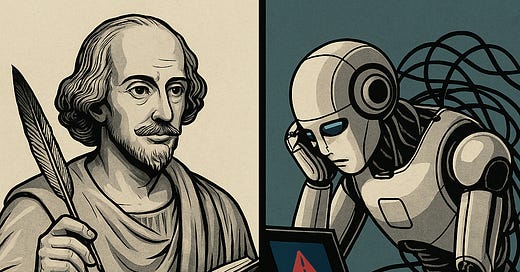I have a liberal arts degree. You know, one of those supposedly “useless” diplomas that make the butt of every “do you want fries with that?” joke. And yet, here I am—decades into a successful career as a business owner, communicator, consultant, and podcast producer. I’ve worked with great companies, incredible universities, and brilliant people. My liberal arts education is not some ironic relic—it’s the engine that’s powered everything I’ve done.
So, with all due respect to the engineers, coders and data scientists, I’d like to push back—strongly—on the idea that liberal arts degrees are obsolete. In fact, with the rise of AI and the slow decline of certain white-collar jobs, the value of a liberal arts education might be entering a renaissance.
Consider this: software development job postings are down 35% since before the pandemic, just as college computer science enrollment rose by 4.3% The market is bloated, and artificial intelligence is already proving it can do much of the work cheaper, faster, and at scale. Many junior coders, once guaranteed high-paying jobs, are discovering that AI doesn’t just write code—it replaces the coder.
It’s starting to look like coders are headed the same way as clerk typists did in the 20th century: once essential, now automated out of existence.
So what’s left? What can’t AI do?
It can’t think critically. It can’t tell a compelling story. It can’t understand context, build trust, or bring emotional intelligence into a negotiation. It can’t inspire a room, or reframe a tired idea in a way that sparks action. But humans can—especially those trained to see the world through the lens of history, literature, philosophy, and communication.
My “cocktail party degree,” as I jokingly call it (because I learned a little bit about a lot of things—making me surprisingly good company at a party), also taught me how to think—not just how to complete tasks. It taught me how to tell stories, how to persuade, how to question, and how to see connections across disciplines.
In a world where AI is advancing by the hour, thinking is the premium skill. And that’s the liberal arts superpower.
We’re already seeing this play out. Top-performing tech professionals are no longer just coders—they’re problem-solvers, communicators, storytellers. The best ones don’t just know how to write code. They know how to prompt machines, manage projects, and lead teams. Soft skills—long sneered at by STEM absolutists—are becoming the new differentiators.
And then there’s the human factor: relationships. Some studies suggest that 70% of people who land competitive jobs do so because they have a connection at the company. A liberal arts environment, at its best, surrounds you with diverse people, ideas, and opportunities to form lasting connections. It forces you to bump into new perspectives, test your beliefs, and develop your voice. That’s not fluff—that’s future-proofing.
Now, I’m not blind to the challenges. Student debt is real, and some degrees are marketed irresponsibly. But let’s be clear: the problem isn’t liberal arts—it’s how we’ve decoupled education from financial literacy and career planning. It's the industrial-scale promise that any degree, at any cost, will guarantee a dream job.
Still, I believe deeply in the power of college—not just as a career launchpad, but as a place to figure out who you are, what you value, and how you relate to the world. If I could wish anything for my own child heading off to college, it wouldn’t just be “skills.” It would be great conversations, lifelong friendships, and a deeper understanding of themselves and others.
If AI is teaching us anything, it’s this: humans need to bring more than just function to the table. We need to bring judgment, empathy, narrative, ethics, and the ability to synthesize complexity. Those are liberal arts skills. And they’re becoming more valuable every day.
So no, I don’t serve fries. I serve ideas. And I’m grateful every day that my liberal arts education taught me how.
This essay was sparked by a thought-provoking conversation on the March 31, 2025 episode of the Prof G Markets podcast. My thanks to Scott Galloway and Ed Elson for lighting the fuse.




